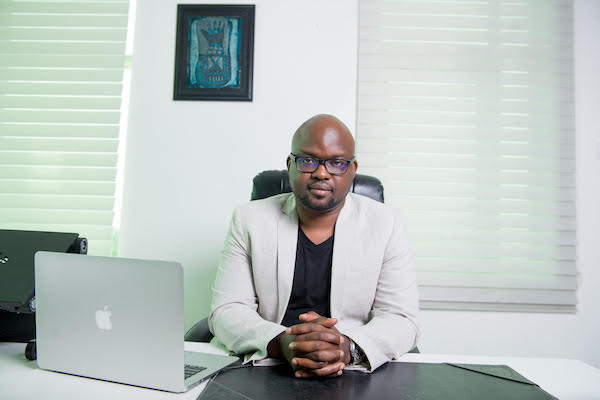Shola Adekoya is the CEO of Konga, and for someone who leads what is arguably the biggest player in eCommerce space in Nigeria, not much is known about him or his views.
As it turns out, we have a mutual friend who connected us some months back, and we got talking — mainly around the needs of small business owners (or ‘merchants’ as he prefers to call them). But coincidentally, we’ve happened not talking specifically about Konga or the eCommerce landscape in general. At the end of one of our many conversations, I said, “Hey, let’s discuss all these other stuff.” Notably, it would be perfect to curate our conversation as I was positive it would be of interest to others.
The opportunity to do this interview arose because I was in Lagos to attend an event organised by PrognoStore in conjunction with the Mumpreneurs Network for small business owners. I later met Shola at Konga offices in Alausa, Ikeja and below is our edited conversation. Enjoy.
Papa: Who is Shola and how would you describe yourself?
Shola: I would describe myself as a builder. I like building things, and this spans across industries — including tech. What appeals to me is creating something new or taking existing ideas and putting solid principles which make them repeatable, to become what I would call a ‘successful business’, fascinates me.
I’ve also always loved numbers, which I guess is a function of my accounting background.
Papa: How did your love for building and accounting background evolve to who you are today?
Shola: My accounting background goes beyond having a grasp of the numbers. It has helped me to think long term and carefully consider the value in what is at hand.
This means while I’m naturally passionate about building, I’m always concerned about the long-term impact.
Papa: You talk about being a builder and obviously doing so in Konga, which is predominantly in the eCommerce space. My views about eCommerce in Nigeria is that this is a long game. Of course, Amazon has shown that eCommerce requires patience and ruthless execution. I listened to Jeff Bezos’s Recode interview, and he talked about the three biggest drivers to get right are Selection, Price and Delivery.
But when you layer that with our infrastructure decay and the lack of purchasing power where a great percentage of people are surviving on less than $2 a day, I think this requires even a longer term outlook.
Do you agree with this assessment? And if yes, how is this reflected in Konga’s approach to the market?
Shola: He’s very right about patience. In e-commerce, you can’t make positive EBITDA from day one. The biggest issue we’re facing in Nigeria is infrastructure, and it’s not just e-commerce, it cuts across multiple industries. I would say over the last two years; that’s where we’ve spent more of our energy and resources to build this infrastructure. It requires patience and execution to solve.
For instance, let’s take logistics — we need to cover the whole of Nigeria. And it’s not just to have logistics; it’s also the efficiency that comes with it. I was looking at a report today, and we currently take 5–7 days to deliver across Nigeria. In the past, the average was 60 days. And this is for both outwards and returns. These are the improvements that guarantee the long-term success of our platform.
Now we can say the same in Payments.
It’s simple for one to assume customers will find it easy to go online, take out their cards and pay for goods. However, not a lot of people have the cards in the first place. I believe it’s been said that we have about 12 million cards in Nigeria, when you take out duplicates, it’s around 5 million. This is before you even come to active cards usage. Compare that to BVN holders of 25 million and a population of 120 million. In summary, card penetration is low in Nigeria.
But when we look into our data on our site and find out that customers have tried to use their card 3 or 4 times trying to make payment and it fails, they now end up selecting POD (Pay on Delivery) option. You begin to understand that even regarding payment, there’s a need for infrastructure. And that’s why we’ve done KongaPay. This has seen us improve from a 40% payment completion success rate to 85% — 88% rate. Which means for us at Konga, we need to spend more time doing the hard work of creating infrastructure.
Imagine refunds? This is a situation where you have to push money back to the customer. If you look at the infrastructure openly available for refund — here are my steps: I need to call the customer to get the right account number, then input the account number manually into the system, I need to check to ensure that the the name on the banking system is that of the customer. All of this admin becomes very cumbersome, and that’s where KongaPay comes in for us.
We have Mercury, which is our logistics software deployed across all our logistics partners. It’s easy to assume it’s all about moving products from points A to B. However, it links to payment, so you’re not just looking at track and trace. You’re looking at track and trace with payment. So you have to create a different flavour of logistics that caters to payment effectively. Which means as you capture typical logistics information on shipping statuses (e.g in-transit, delivered, etc), you are also automatically reconciling payments which also differs depending on payment type (Prepay or POD). You must also be able to see all of this in real time especially if the item is being returned.
The last bit of necessary infrastructure is developing the local talent to build the technology that we will require. We currently have capable developers but given the vision and the amount of work still to be done in the next 3 to 4 years, there is a talent gap on the horizon. The fight for talent will be fierce as it’s not just our industry that will need these skills as the 4th industrial revolution comes upon us as a nation. At Konga, we are thinking through how we can start building the right talent for the future and you will see us engaging such talents in schools and universities.
Papa: I sympathise with all of that and acknowledge that the lack of infrastructure means you have little or no choice, but to build them yourself.
On the other hand, I’m wondering that if so much energy is spent on infrastructure, is there a short-term impact on the core purpose of an eCommerce platform? Let’s take an example; a customer wants to buy a black jeans size 34. Is there a risk that they can’t find it because you’re busy solving all these infrastructure headaches?
Shola: From the customer’s point of view, they rightly don’t care about our infrastructure issues. Whatever we have to go through in respect of logistics, payments, etc., it’s our job to mask that away from customers such that whatever they order, they get. If a customer orders a red shirt size 12, he doesn’t want a white shirt size 12. We’ve mastered the discipline of doing that through warehousing. Initially, from when a warehoused item is ordered to when it’s shipped takes 48 hrs, now we’ve got that down that to around 3hrs.
However, the great thing about running a marketplace is that you can pass on this knowledge to your merchants. For us, It’s about training our merchants to be able to operate at that level which includes customer support. And that’s why we’ve opened up our warehouse and logistics facilities to them.
In all, we have to build our infrastructure to deliver to the customer. If we have to be telling the customer, ‘here’s our problem’ — we’ve failed. A customer should get what they want when they want it. That’s why investing in infrastructure is a huge challenge, but it’s also an opportunity for us to get things right, which makes the customer enjoy the online shopping experience.
Papa: Alright, makes sense. To meet the immediate needs of the customer, you require infrastructure.
Now you spoke earlier about ‘developing local talent’, however, you’ve undergone some layoffs and also announced that this is a periodic exercise. I can understand that this sort of communication of downsizing might be right for the public/markets, however, how does that reassure prospective developers? And if you’re laying off your current developers, is this not the opposite of ‘developing local talent’?
Shola: We didn’t let go of any developer, just to correct that wrong impression.
What we’re trying to do is build a business that’s as efficient as what you get anywhere in the world. To do this, we reviewed our operations: looked at our manual processes, areas that we can improve, etc. Improving operations invariably means it will impact on headcount as we get better.
When we get efficient in a particular process, it sometimes means we don’t need as many people in that area anymore. We’ve had to go through the severe and painful exercise to let colleagues go, as we changed operational focus. And in some cases, we’re talking of people who have worked here for a long time. These were not easy decisions and were not carried out lightly.
However, specifically for developers, we didn’t let any go during this exercise. We’re recruiting more as we’ve changed our focus towards marketplace and technology. We’ve also recently started an internship programme for developers. Where graduates can come right out of university, and join us, so we can equip them with the right skills.
In terms of communication to the market; what we’re doing is conducting an operational review exercise every six months — that’s what we communicated and unfortunately got misinterpreted as layoff every six months. However, I can also say that since July when we last did this exercise, we’re operating at our optimal level and don’t need to let go of any staff, from where we are now. I look at our performance today; it’s a vast improvement over where we’ve been as a business.
Papa: Let’s talk about leadership and succession. I’m specifically thinking of Sim Shagaya, whom I haven’t had the privilege of meeting. But by most accounts, he’s one of the best founders around our part of the world — judging by the companies he’s founded and the impact they’ve had. For instance, he started Konga. And now you’re the man in charge. How do you feel that transition has gone?
Shola: The beauty of what’s happening in Konga with Sim moving up to chairman, is that there’s continuity in the goal of the company. We want to be the engine of commerce and trade, and that’s not changed. The fact that I’ve been here since the 10th month of Konga starting and we’re now at 4.5 years means that I understand it inside out. Sim has left a fantastic company and a great legacy. For me, it’s all about furthering that cause. We already have an objective that we’re pushing, and it’s making sure that we see it come to fruition.
Maybe the only twist you will find with myself, is like I said earlier about my background, is that as we build, I inject the economics/numbers balance harder. And we are trying to build a business that even if we give out our services for free, customers or merchants will understand the value of what we offer. It has to be self-evident.
What we’re building is different. I wouldn’t compare myself to anybody. I think what you will find is Shola Adekoya is different but what I would say is that I’m as passionate as it gets. I’m passionate about Konga and what we’re building right now.
Papa: I didn’t know you’ve been here since the 10th month. So what I’m getting is that since you’ve been here, you understand the business very well and more than capable to lead it. Is that right?
Shola: That’s correct. I joined Konga as CFO, moved to COO and eventually CEO. And what you will find is that in a lot of the history of Konga; how we’ve pivoted the business, the challenges we’ve had, and successes, are landmarks that I’ve felt. Not just heard about them, I’ve felt them — as I’ve been directly involved.
And as the saying goes ‘behind a successful man is a woman’, I think what you will find is behind a successful leader are capable lieutenants. In my case, as Sim was doing fantastic work in the front end, there was also a lot of work I was doing in the background. Doing all of that meant that I understand the business inside out which prepared me for my current role. Today, we also have quite a number of lieutenants doing some fantastic work in the background.
Papa: Moving slightly away from Konga, what will you say has shaped your career the most till date?
Shola: Earlier on in my career, I’ve always loved to learn new things, and back in the U.K since 2001, I worked in contract roles. These were usually for 6 or 9 months duration, which came with specific business issues that needed resolving. So people only called me when there were problems. Which means I’ve become used to situations where there are challenges that needed fixing within a specific time frame.
I have therefore worked in various and diverse organisations which has given me the ability to work with a wide range of people tackling different challenges and this has been helpful to my development as a professional.
Papa: Talking of how you cope with challenges, reminds me of how earlier this year Kinnevik released Q2 numbers that painted an interesting picture of Konga’s business. There were lots of reactions, from the local press, and even some more, after your LinkedIn post. Surely this was a challenging period. What’s your take on all the events?
Shola: Yes it was a tough period. It was a tough period because a lot of people had a go at the company and our performance. Personally, it was a period that I also realised that when you have a passion for something, it can easily spill out into emotions. Given my position and the fact that we are a private company, I couldn’t speak directly to the issue, hence my post with a lot of indirect tones.
At that point, I wasn’t thinking about it just for Konga but the wider tech space. If you put so much doubt and negativity into tech, there could be wider repercussions. However, I must say those times gave me a lot more determination to make things work. It was a learning experience for me.
Papa: So can you say you’re looking forward to the next Kinnevik’s numbers?
Shola: Yes, I am actually. I’ve always been very open with all our stakeholders including our staff. And right now, everyone knows the huge milestones we’ve achieved over the last quarter. I think we are still on the right path.
Papa: Right, so we’ve talked about Konga extensively and also what drives you. Moving on even beyond eCommerce, what in respect of general trends happening in the tech space keeps you up at night?
Shola: What keeps me awake is simply how the rest of the world is moving so fast in technology. It feels like Nigeria is being left behind. Not because of lack of trying or that we don’t have capable hands, but we currently see technology as an opportunity to either save cost or produce more.
Whereas technology is leaning towards becoming a way of life. It’s becoming entwined in the daily lives of people in other parts of the world. And I’m not seeing that Nigeria as a country is embracing that fast enough. And that’s what concerns me most especially as we potentially have the know-how from a technical angle.
The last bit is how Africans own technology. The next wave of industrialisation is going to be based on technology. Now the question is — how much of this technology would we own. And how does this affect our lives and our continent in the long term?
Papa: Finally, to wrap up, what would you consider as a legacy or north-star you would love to work towards achieving?
Shola: As I’ve mentioned earlier, I have a passion for building or creating new things. My hope is that I can bring the perfect blend of technology and business and entrench this sufficiently that it gives some young entrepreneurs in Nigeria something to aspire to and motivates them to make even better things.
Editor’s note: Quality Time with Papa Olabode is a series that contains interesting conversations with people in the Nigerian ecosystem, featuring PrognoStore co-founder, Ade “Papa” Olabode. This post first appeared on Medium.





















